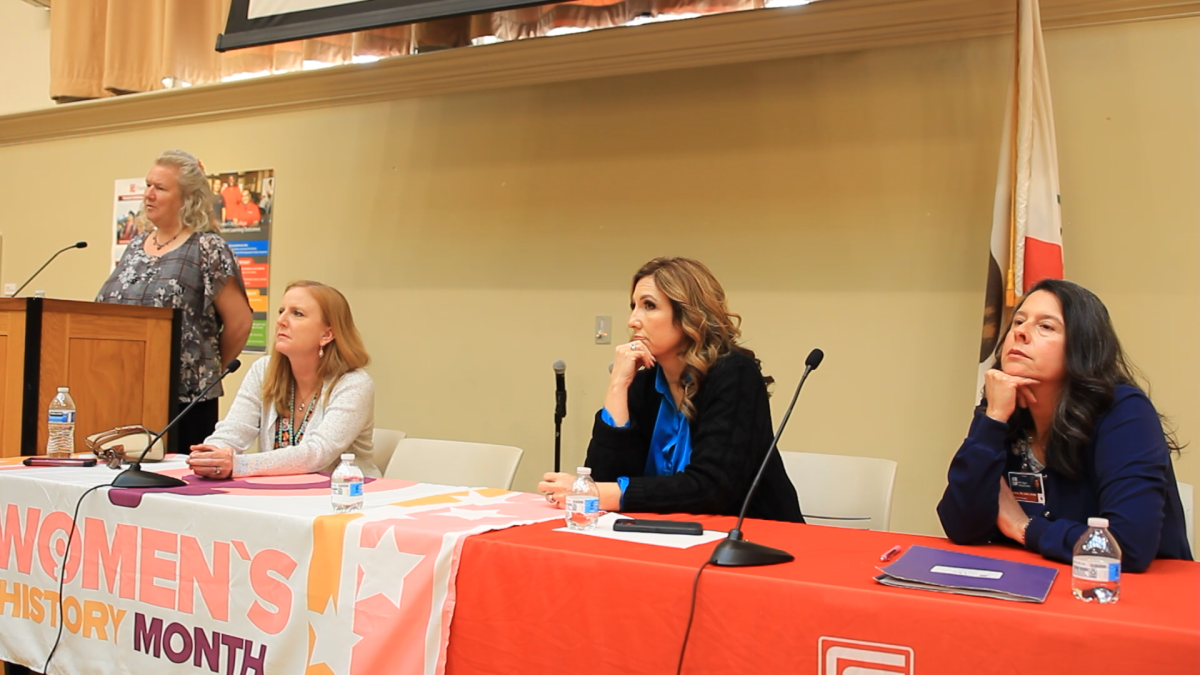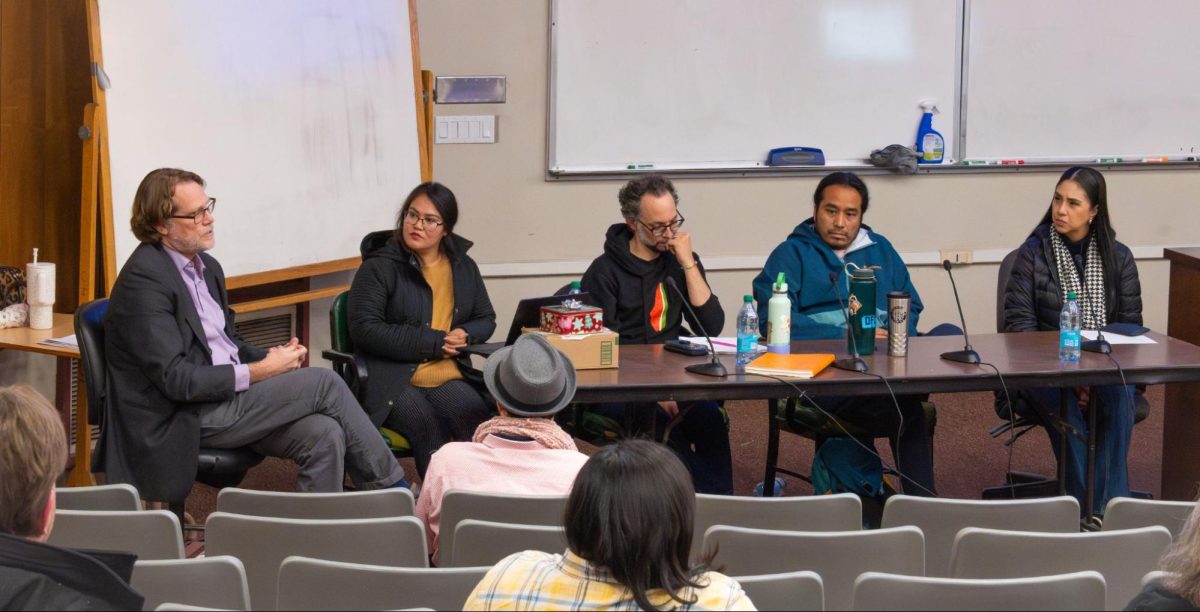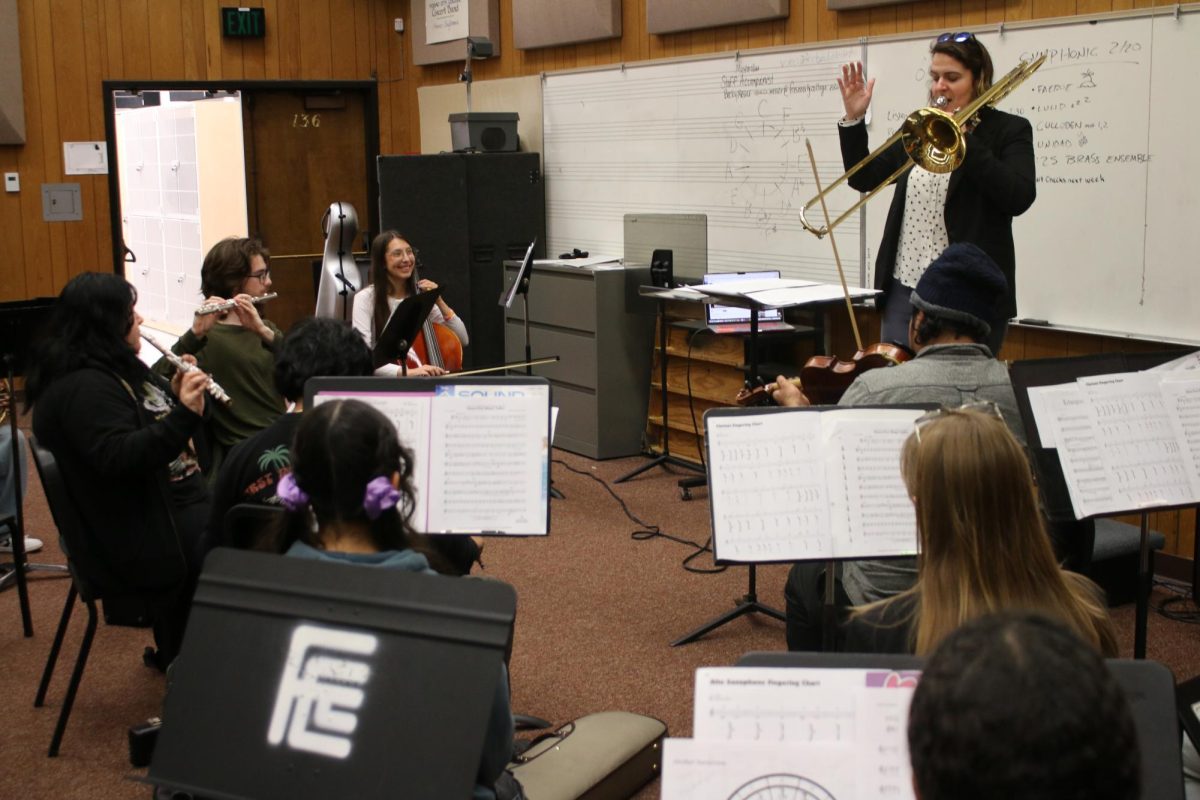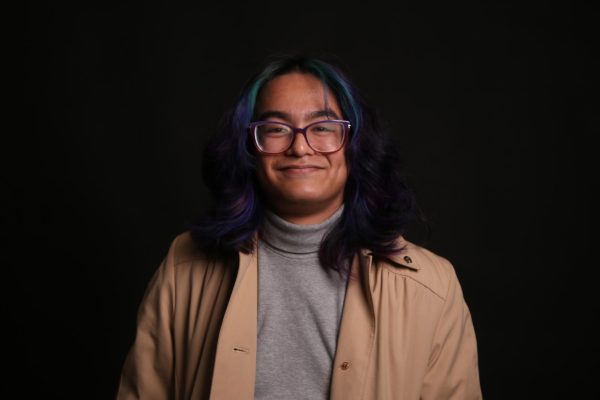State Center Community College Foundation – A nonprofit organization that supports students at State Center Community College District campuses including Fresno City College, invests in funds that contain environmental polluters and weapons manufacturers, according to an analysis of a recent investment report.
The foundation’s assets are held in investment funds such as exchange trade funds (ETFs) and mutual funds which buy stock in a multitude of different companies.
One fund in the report, Amplify ETF TR Cybersecurity (HACK), holds stock with companies in the cybersecurity field including General Dynamics and Northrop Grumman, defense manufacturers involved in human rights violations against civilians, war crimes, pollution and surveillance on the U.S.-Mexico border. Cisco Systems, the second largest holding in the fund, conducts business in the occupied West Bank on Israeli settlements considered illegal by the International Court of Justice.
Another fund listed, iShares U.S. Utilities ETF, buys stock in utilities companies that are also major polluters. Southern Company is the second highest greenhouse gas polluter in the U.S. while Duke Energy is the third highest and NextEra Energy ranked 11, all of whom comprise the top three holdings in the index.
Other companies including RTX Corporation, Lockheed Martin, ExxonMobil and Chevron are also linked to the foundation’s investments.
“I don’t think that investments should be made, especially when they exist off of other people’s suffering,” Cas Haugen, a political science/philosophy major and vice president of FCC’s Gender Sexuality Association (GSA) club, said.
The foundation holds $28.9 million in assets as of June 2024. California-based wealth firm Destination Wealth Management (DWM) has handled the foundation’s investments since 2001. They conduct the investments with the oversight of the foundation’s board of directors.
“We shouldn’t be operating this school like it’s a business,” Haugen said.
What are College Endowments?
Many U.S. colleges and universities maintain a collection of assets known as endowments. These endowments are invested to support the institution’s goals such as giving student financial aid, according to an email from Todd Ely, an associate professor of public administration at the University of Colorado, Denver.
Endowments grow from more donations and investment returns. Ely noted that the majority of endowments are restricted, meaning only the money made from investments can be spent and cannot dip into the initial donation amount.
As a result, spending of the endowment assets are typically limited to a small percentage on a yearly basis.
Over time, educational institutions have given investment control to third-party firms, including Destination Wealth Management.
Under internal control, there was more oversight over where money was invested. Third-party firms offered access to different types of investments known as alternatives, which includes private equity and real estate assets.
ETFs or mutual funds make up most endowment investments. They limit risks of loss by maintaining holdings in different corporations across the world.
These investment funds hold stakes in one or more sets of industries and can contain up to thousands of holdings. Many ETFs are index funds that track the market and develop their portfolio around.
“If a college or university invests in an index fund that tracks the S&P 500 [stock index of the 500 largest companies in the U.S.] then it does not get to pick and choose among the 500 indexed companies,” Ely said.
Index funds are managed by large corporations including Vanguard and BlackRock’s iShares. These funds are commonly chosen for their low costs and the benefits of diversified holdings, at the expense of control over where the money goes.
The Foundation and Students
The foundation is an endowed nonprofit organization supporting SCCCD students at FCC, Clovis Community College, Madera Community College and Reedley College – the last of which also has its own private endowment.
It funds scholarships, with a plan to award over $1 million to students in 2025, according to the State Center Community College Foundation Executive Director Rico Guerrero.
It offers mini-grants for faculty to address classroom needs and further support students.
SCCCD campuses may also receive up to $30,000 annually from the foundation to make infrastructure improvements such as theater marquees, renovating career centers or repairing bus stops. The presidents of each college present needs/projects on their campus which the foundation can fund.
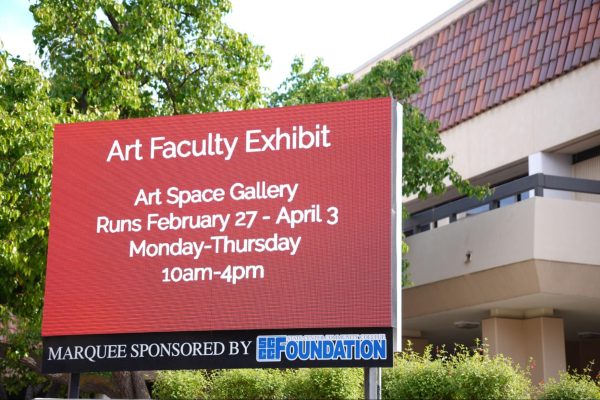
The foundation supported food pantries including FCC’s Ram Pantry before the program was funded by the college’s operating budget.
“We’re aligned with the district as far as what we do. We’re focused on how we support our students,” Guerrero said.
Guerrero mentioned that the foundation has facilitated $120,000 in scholarships to “Dreamers,” immigrant students associated with the DREAM Act.
He added that the foundation gives out scholarships in alignment with the district’s mission of equity and inclusion.
“Our Board [of Trustees] has a mission and vision to support student success, so we know how valuable the foundation is in writing scholarships for our students,” SCCCD Board of Trustees member Danielle Parra said. She maintains a role on the foundation’s board of directors.
Guerrero said the foundation’s endowments are typically restricted donations from corporations and private individuals with designated purposes such as creating scholarships or programs.
Unrestricted funds are allowed to be used by the foundation as seen fit, such as in the case of giving money to campuses for infrastructure needs.
The Foundation’s Structure
The foundation is a 501(c)(3) and the only organization of the SCCCD that is able to fundraise, according to Guerrero. It is also classified as a 509(a)(3) Type III functionally integrated organization which supports and maintains close relations to the district.
The foundation requires district representatives on the board of directors in order to meet this classification.
The 15-member board of directors has two members from the SCCCD Board of Trustees, according to Guerrero.
The district chancellor is an ex-officio member; they are able to vote as a result of their district position.
However, Guerrero said their vote is not required for the foundation to pass a resolution, if the ex-officio member were to not be present for a meeting.
The foundation board sets the investment policy which Destination Wealth Management follows and bases its investments upon. The investment firm then reports on a quarterly basis to the foundation.
The performance of the stock portfolio is analyzed by the foundation’s finance committee, who can make recommendations for changes to strategy and placement of investments to the full board of directors, according to Guerrero.
The Foundation’s Investment and Gift Policies
The foundation’s investment policy explicitly prohibits investments in “oil, gas or other mineral exploration or development programs,” but makes exceptions for investments made in investment pools such as ETFs.
It also places restrictions on investments into commodities which include metals and oil, but with the same exceptions.
The placed restrictions were based on discussions with the foundation’s investment committee to take environmental sustainability into account, according to a response from Destination Wealth Management’s CEO, Michael Yoshikami. He also added that diversified indexes led to investments in renewable energy initiatives.
The policy does not include specific companies or types of index funds which the investment adviser must avoid.
Guerrero said investments are not based on social responsibility or ethical meters and focus on the bottom line. He said the goal is to promote stock growth and allocate funds for scholarships.
“At the end of the day our goal is to provide as much as we can to students,” Guerrero said.
While the foundation maintains a gift policy, it does not contain social responsibility based restrictions. Donors have options to gift stocks, unused retirement assets and mineral interests such as oil and gas.
“Since I’ve been here [9 years] there hasn’t been anything we said no to,” Guerrero said. “There hasn’t been anything where the [foundation] board had to question whether to accept it or not.”
He noted that the foundation facilitated grants from Chevron to support the FCC Women in Engineering program that encourages female high school students to enter science, technology, engineering and mathematics (STEM) fields.
Student Benefits Come at What Cost?
“If it’s [the foundation] making unethical choices to make money to benefit people; first off, why should my benefit come from other people’s suffering and second off, even if that’s the case, why are we not seeing any benefits?” Haugen said.
They said that while the reported investments are not held directly in corporate shares, school district funds remain tied to damaging industries.
“Your hands aren’t clean just because you don’t see where the money is going directly. Your hands are dirty with blood, just like my hands are for going to this school,” Haugen said.
They explain the belief that no benefit through scholarships could justify the investments made with foundation endowments. According to Haugen, the environmental and human suffering caused by placing money into damaging industries affects students and any benefits do not cancel out the harm.
The GSA vice president also pointed out the lack of support for equity in the lack of queer safe spaces, a worship room for various religious denominations and spaces for Extending the Class (ETC) tutors at FCC.
“If we can’t even get gender neutral bathrooms for students and instead get the bandaid plaque signs that say ‘You are welcome here’ that are constantly ripped off, where’s the equity?” Haugen said.
David Alvarado, a political science major with FCC’s Movimiento Estudiantil Chicanx de Aztlán (MEChA) and the Social Justice Club, felt corporations exist to make the most profit for their shareholders, making ethical investing difficult to achieve.
According to Alvarado, the seeking of private profits leads to their involvement in war crimes, political corruption and genocide in Palestine.
“Where’s the equity in that?” Alvarado said. “I’d rather not get a scholarship, I’d rather have to struggle and I’m sure all the students would as well, than know that scholarship comes from money that was used to kill kids.”
Alvarado stated it was hypocritical and frustrating for a Hispanic-serving institution and school that prides itself on financially uplifting people to invest in corporations with negative human rights track records.
“If you’re more worried about the bottom line than you are about human rights, why are you in education?” Alvarado said.
Haugen said Chevron’s grants at FCC are a form of “pinkwashing,” a way to uplift the company’s reputation while committing environmental damage in places such as the Amazon rainforest, hurting indigenous women and communities.
“If they truly cared about women, they wouldn’t be destroying the environment around them,” Haugen said.
They felt Chevron’s diversity focus does not change their harmful impact. Company decisions aren’t based on moral principles, but on making profit or normalizing their damages in society.
“I don’t fault the STEM faculty,” Haugen said. “I do fault the system in that we need something like [corporate grants] to happen. We’re a public school, can’t we be finding better ways to obtain funding?”
SCCCD Viewpoint on Divestment
Guerrero said divestment – the sale of an investment – from funds tied to these corporations has not been brought up. He did not note anyone, including donors, who have taken issue with the foundation’s approach to investments.
“As of now, the foundation does not have a stance,” Guerrero said. “Not saying condoning any of the companies we are invested in, but it is something that has not been an issue with the board and the foundation.”
He said a divestment motion could be authorized by the board of directors and the investment adviser would follow the decision.
Guerrero maintained that there would be several factors to consider before taking a stance. He believed there could be impact on the bottom line and investments performance when making considerations of divestment. He also noted the optics and that any stance the foundation takes could alienate potential donors. Effects on the bottom line could affect student benefits.
He noted that investments could not be pulled from individual companies in an investment fund and divestment would require the investments to be pulled out of the fund entirely.
Parra said student concerns about corporate partnerships and the foundation’s investments were important, but stated that the district’s potential cutting of a partnership or divestment could jeopardize workplace opportunities for students.
“These companies invest in our community and they are making an impact on our economy and our workforce,” Parra said.
When asked on whether companies implicated in controversy conflict with the district’s mission, Parra maintained that they specifically align with the district’s aims of supporting student success.
The Goals of Divestment and Beyond Endowments
“The foundation is really small potatoes compared to other pools of capital. But, that doesn’t mean we shouldn’t concern ourselves with how we invest,” FCC history professor Paul Gilmore said.
Gilmore said it has been a common pushback to label divestment movements and protests as being ineffective.
He stated that it was considered impractical to divest from companies in apartheid South Africa, a sentiment that continues with the Boycott, Divestment and Sanctions (BDS) movement to support Palestinian liberation.
“Then 40 years later, if you’re victorious, they’ll say ‘Well, I was on board with that and it was a great thing to do,’’ Gilmore said. “It’s always with hindsight, people look at it.”
He mentioned that investments are always a political decision. The goal of solely focusing on the bottom line is a political statement similar to taking an investment stance based on ethics.
Gilmore said divestment movements can have a goal to affect the financials of companies who are the target of divestment. He said the loss of capital might pressure companies to change their practices.
These divestment movements may also highlight certain companies for their practices, making them socially frowned upon and sometimes affect their financial performance.
He also pointed out a separate moral goal, in which divestment aims are not geared towards financial impact, but preventing their institution’s ability to profit from a case of injustice.
“The one side of it is: Will it be effective? The other side is: Do you want blood on your hands?” Gilmore said.
Alvarado felt that divestment by the foundation would be symbolic and show a receptiveness to student concerns. He also said it could set an example that investments could be done more ethically, by taking their business to companies that engage in less harmful practices.
“I don’t believe there’s any way to truly participate in investing large sums of money in an ethical way within capitalism, but at the same time, there’s also a way to not do it,” Alvarado said.
Alvarado felt that endowments as well as involvement of corporations such as Chevron in education funding were examples of the poor funding of education.
He said better funding of education through higher taxes on corporations would lessen the need for grants and endowments that are implicated in controversial companies.
“Schools should be more accessible. Scholarships are a bandaid solution for rising costs in obtaining education,” Haugen said.
They pointed to making connections within the student community as a way to counteract any theoretical harms from divestment, by addressing food insecurity and other basic needs.
Haugen, a co-founder of the Queer Closet Exchange at FCC, felt it was evidence that students could provide for one another outside of institutions. The project makes clothes, hygiene products and gender-affirming items accessible to all students.
They said it was necessary to question the institution’s ability to support students while “propagating so much human suffering.”
“Institutions are so ingrained into corporations,” Haugen said. “To talk of divestment is to talk of dissecting the inherent tumor that we have growing.”
Ely noted the focus on growth of assets pushes away social objectives and stances from taking precedence in endowment management.
“Even if there is consensus that an institution should no longer condone an activity via investments, divesting for political or social reasons fundamentally challenges the traditional role of higher education endowments,” Ely said.


